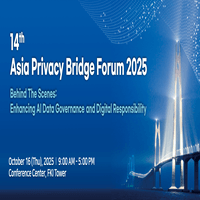
9th APB Forum, 2020 Fall
Data Governance and Privacy in the COVID-19 Era


● How to Prepare for Privacy Challenges in COVID-19
Pam Dixon (World Privacy Forum, USA)
WPF Executive Director Pam Dixon will be presenting at the APB Forum on the risks, challenges, and potential solutions regarding the intersection of COVID-19 and the uses of identity in a global public health crisis. Also, she will share the COVID-19 lessons learned and challenges ahead.

● Data Governance and Privacy in South Korea
Kyoungjin Choi (Gachon University, Korea)
The voice of personal data protection is constantly growing, while the voice of the development of the data economy through the utilization of personal data is not small. This topic will look at how the international community is making efforts to protect personal data while harmonizing the two conflicting values such as EU GDPR and APEC CBPR.

● Privacy Law in Turkey
Özgün Deniz (Global B Law, Turkey)
Attempts to Protect Personal Data in Light of Turkish law.

● Stay-Home Notice and COVID-19 in Singapore
Zee Kin Yeong (Personal Data Protection Commission, Singapore)
Depending on the traveler’s scheme of travel, he/she may be required to take the COVID-19 PCR test upon arrival in Singapore or before the completion of their Stay-Home Notice (SHN). Travelers serving their SHN will receive the details of their test appointments at their registered mobile numbers. He will discuss ensuring a balance between protection and use of personal data in COVID-19 era.

● Self-Quarantine App and Privacy Issues in Korea
Jong Hyun Park (Ministry of the Interior and Safety, Korea)
- How Korea copes with COVID-19
- Why the Self-Quarantine App ?
- Key features of the Self-Quarantine App
- Privacy Issues of the Self-Quarantine App
- Privacy Policy on the Self-Quarantine App

● Testing, Tracing, Treatment Strategy vs Privacy in ROK
Tae Hyong Kim (Soon Chun Hyang University, Korea)
After the first imported COVID-19 case on January 20, 2020 in Korea, preparations for the pandemic had worked with relative success. There are three “T” strategies where the “T” stands for Testing, Tracing and Treating COVID-19. However, there are conflicting ideas on how to protect privacy during such a pandemic. Earlier concerns about the lack of transparency on tracing during the MERS outbreak in Korea in 2015 had a positive influence on how to accept the health authorities’ policy.

● Initiatives of the Personal Information Protection Commission
Saki Kato (Personal Information Protection Commission, Japan)
In Japan, as well as many countries around the world, new infection cases are reported every day that proper handling of data is crucial in order to respond to the situation. The speaker will share the initiatives of the Personal Information Protection Commission Japan including those to strike the right balance of protection of personal information and utilization of data to contain COVID-19. She will mention the Commission’s initiatives for free flows of data with trust as well.

● Development and real-world application of an AI-based decision support platform for COVID-19
JoonNyung Heo (Armed Forces Medical Command, Ministry of National Defense, Korea)
Clinical decision support system using AI-based outcome prediction may be beneficial for patient selection during COVID-19 pandemic. This study developed an AI prediction model with a dataset that includes all hospitalized COVID-19 patients in Korea, and constructed a platform that can be used for remote patient monitoring or self-care during quarantine. The prediction model showed an AUC of ~0.9 upon temporal external validation, and the platform is actively used in the clinical field.

● Philippine Data Governance and Privacy in the COVID-19 Era
Jonathan Rudolph (National Privacy Commission, Philippines)
The COVID-19 pandemic has severely disrupted the operations of governments, businesses, and other organizations globally. It has effectively accelerated the digital transformation of the world by several years. Overnight digitization, in turn, has posed new and unique risks, threats and harms to data subjects. This presentation will discuss the peculiarities of the Philippine Data Privacy Act of 2012 and how the National Privacy Commission administers and implements the provisions of this Act and monitors and ensures compliance of the country with international standards set for data protection, especially at this time. It will also tackle significant trends and developments on data privacy and the fight against COVID-19 through privacy-preserving digital solutions.

● Data Governance and Privacy in the COVID-19 Era: APEC's challenges and future directions
Julio Pertuze (APEC DESG Chair, Chile)
- The impact of COVID on APEC Agenda
- Ongoing work at the DESG
- Future directions on data governance and privacy
- New technologies and main challenges ahead
● Protecting public health and personal data privacy during COVID-19 pandemic – The Hong Kong experience
Aki Cheung (Privacy Commissioner for Personal Data, Hong Kong)
The COVID-19 pandemic has caused unprecedented disruption to our lives. Yet, digital technology has enabled society to continue functioning. Nevertheless, digital technology comes with inherent risks to personal data privacy – the key is to strike the right balance between protecting personal data privacy and the public health. In this presentation, we will outline some of the work undertaken in Hong Kong to combat COVID-19 by the use of data and the efforts made in ensuring privacy protection.

● Preserving the Personal Information and Building the Trust in COVID-19
Beomsoo Kim (Yonsei University, Korea)
The COVID-19 pandemic has challenged public health capacity and policy across the globe. Korea’s approaches reflected citizens’ demands for strengthening privacy protection in terms of data handling and virus management, and worked to find a balance between the two.
Contact Us
Barun ICT Research Center
50 Yonsei-ro, Seodaemun-gu, Seoul 03722, Korea
Tel : +82-2-2123-6694
Email : barunict@barunict.kr













